|
4/20/2017 Comments Convincing Christians: On the Work of Animal Liberation in the Name of Jesus—a Reply to Socha and TaylorBy: Nekeisha Alayna Alexis Editor's Note: This article was originally published at Animal Liberation Currents. I said in my heart with regard to human beings that God is testing them to show that they are but animals. For the fate of humans and the fate of animals is the same; as one dies, so dies the other. They all have the same breath, and humans have no advantage over the animals; for all is vanity. All go to one place; all are from the dust, and all turn to dust again. Who knows whether the human spirit goes upward and the spirit of animals goes downward to the earth? 1 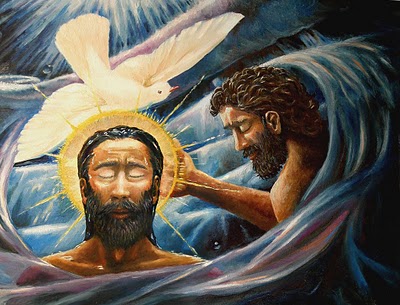 Baptism of Christ: Jesus is baptized in the Jordan River by John. By Dave Zelenka Baptism of Christ: Jesus is baptized in the Jordan River by John. By Dave Zelenka I do not remember how I first came across Ecclesiastes 3:18-21. What I do recall is that I found the passage unexpectedly and I loved it immediately. The poetic text, which trespasses against the human-animal binary, resonated with my perspectives as a vegan, animal liberationist, critical animal scholar, and Christian immersed in Anabaptist theology and ethics and influenced by anarchist politics. Now one of my favorite verses, it is one part of the theological groundwork that informs my spiritual, intellectual and emotional commitment to shalom2 with all God’s creatures. That Ecclesiastes 3:18-21 seemed to pop out of nowhere — that I never heard it preached in a sermon or during Sunday School — testifies to the church’s widespread inattentiveness to other animals and our shallow knowledge of the Bible in general. Even when Christians do notice texts like these, we tend still to distort their meaning. As Rachel Muers notes, Ecclesiastes 21 “has been read as emphasizing the difference between humanity and ‘the beasts that perish.’ In context, however, it makes more sense as a reminder of how questionable the dividing line is between us and the ‘beasts.’”3 An extensive, scholarly examination of Scripture as well as church history, hymnody and other Christian artifacts reveals that mutuality, sameness and interconnectedness between humans and other animals are strong vibrant themes within the faith. Indeed, these themes are more prevalent than our contemporary readings allow us to see, shaped as we are by legacies of the Enlightenment and industrial revolution, by antiquated ideas about human and animal biology, and by anthropocentric philosophies and technologies. Since becoming vegan, a journey that began and crystallized while I attended seminary, I have become increasingly aware of biblical texts and trajectories that decenter humanity and undermine support for dominating other animal persons. These alternative streams interrupt the prevailing narratives of God-ordained exploitation that comprise so much of Christian discourse, practice and belief. Yet they usually go unnoticed, not only by Jesus followers but by our critics as well.
Comments
By: Joanna Shenk  Note: Sermon preached at First Mennonite Church of San Francisco and originally posted at Radical Discipleship. Isaiah 58:1-12 When my older brother went to college, I remember being taken aback when he said his roommate’s mom was an anarchist. I felt so sorry for his roommate and figured he probably had a terrible childhood. In my mind, being an anarchist meant something related to the anti-christ. It was all one category to me because I thought it was all related to the same word. Fast forward to seminary, after I had learned to spell better and had a bigger vocabulary, and I realized the words weren’t synonymous… I heard about this website called Jesus Radicals that was coordinated by a couple people on campus at Anabaptist Mennonite Biblical Seminary. I learned that the point of the website was to put Christianity and anarchism in conversation with each other. That seemed curious to me and the people who ran the website seemed cool. Through conversation and overtime it just started to make sense to me that people in the Anabaptist tradition would be influenced by anarchism. It was also around this time that I realized feminist was not a scary label either. It just made sense to me that every person regardless of gender should be respected as fully-human and that people following Jesus would want to undo systems of power. 8/25/2016 Comments A Blog Commentary on Luke's Gospel, Written for Settlers in the Occupied Territories Called Canada (Part, 1)By: Dan Oudshoorn 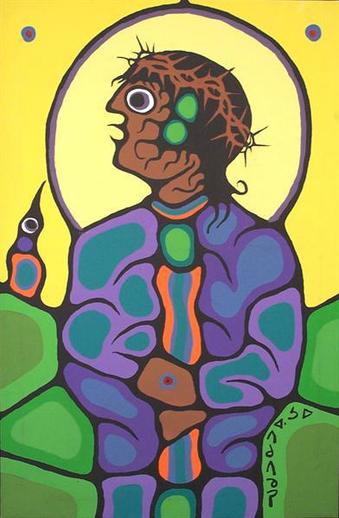 Painting by ᐅᓵᐚᐱᐦᑯᐱᓀᐦᓯ. Painting by ᐅᓵᐚᐱᐦᑯᐱᓀᐦᓯ. Note: Originally published on Dan's blog, On Journeying with Those in Exile Jesus was an Indian. If you don’t understand that, you won’t understand any of the rest of it, so you’ve got to get this first. Let me try to be clear about this. By saying that “Jesus was an Indian,” I don’t mean that Jesus was from India. India didn’t even exist back in his day, given that what we call India was actually a number of different kingdoms or empires rooted in people like the Satavahanas, or the Indo-Scythian Sakas, or the Mahameghavahanas, to name just three of about a dozen different options. So I’m not saying Jesus was a proto-Indian, as though he came from that region. Furthermore, although a fringe group of people like to say Jesus went to India to study and learn in the years we hear nothing about in the canonical Gospels (for example, in an universally discredited book claiming to offer “irrefutable evidence” and entitled Jesus Lived in India, Holger Kersten argues Jesus lived in India when he was young, where he became a spiritual master in Buddhism, and then returned there to grow old and die after he rose from the dead), that’s not what I’m saying. No, Jesus was an Indian in the same sense that the Haudenosaunee, the Anishinaabeg, the ᓀᐦᐃᔭᐤ, the Wet’suwet’en, the Sḵwx̱wú7mesh, the Tlicho, and the more than 630 First Nations in Canada are Indians. And Jesus is an Indian in exactly the same way that members of all of these nations are Indians. Because what does it mean to say that the Indigenous peoples of Turtle Island are “Indians”? Well, to begin with, it means that they are a people who have been colonized by a foreign power who gives them names not of their choosing. This applies as much to people as it does to the land. Hence, Turtle Island is no longer known as Turtle Island. It is called North America, and Canada, and the United States of America are the nations that are said to be present there (I’ll stick to Canada in what follows, as that is the land my people have colonized). And in Canada, for most of its history, the original peoples – the Onkwehonwe to use the Kanien’kehá:ka word – were not known by the names they had received from the land but by the names given by those who colonized both them and the land (although it is wrong to imply that the people and land can be separated and thought of as two distinct entities). They became Indians because that was the name given to them by the settlers who wielded power over Life and Death and who gave out the latter far more than the former. 12/27/2015 Comments Where can anger live?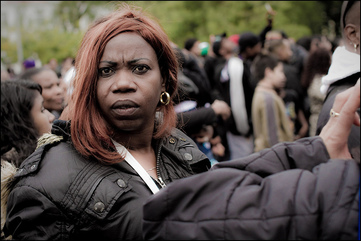 "Now what?" by Elvin. (Flickr/Creative Commons) "Now what?" by Elvin. (Flickr/Creative Commons) By: Austin Channing Editorial note: This post was originally published on www.austinchanning.com My friend made plans to come over. Before she arrived, she sent me a text warning me that the "well-meaning" white folks at her para-ministry job made her especially mad that day. She then added, "I hope my anger will wear off by the time I arrive." Without thinking about it I replied, "Your anger is welcome here". As I thought more about her concern of carrying the anger with her, I tried to think of places where our anger is truly welcome. It's generally not safe to be angry at work- even if there is good reason to be. It's certainly not safe to be angry at church- violating the unspoken rules of niceness, politeness, graciousness and forgiveness. To be angry at school is often invalidated or dismissed altogether. I remember often being asked, "If you are so angry here, why not just go to another school?" So where can we be angry? 7/13/2015 Comments Our Identity as Relational Beings: a posthumanist response to claims of exploitation in the story of creationBy: Kyle Summer 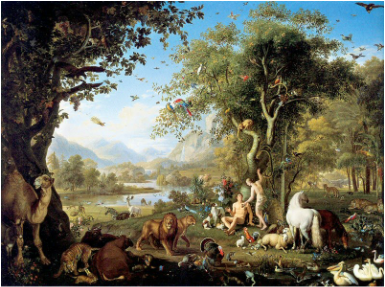 It is often argued that the creation stories in the Hebrew Bible lay out a framework in which humans are given permission from God to do what they please with the rest of the created world. The Bible convincingly serves as a means of justification for the mistreatment and exploitation of non-human animals as well as a lack of overall concern for environmental degradation. Some prominent thinkers often point a blaming finger towards the creation accounts presented to us in Genesis to illuminate the origins of animal and environmental exploitation. Though the majority of these critiques come from a misunderstanding of certain themes that occur in the first chapter of Genesis (i.e. Image of God, dominion, etc.), the second chapter of Genesis provides us with a sound argument against such claims. The response to the charge that the creation accounts found in Genesis are the primary cause of animal exploitation and environmental degradation is one that can be found in almost every commentary that exists on the book of Genesis. Their brief mentions of human/non-human relationships, however, are often eclipsed by their focus on the fall of humanity. This is unfortunate because such a primary focus on the human relationship with the self, as opposed to the human relationship with the other, is far outside of the intentions of the created order and is precisely where the subjugation and exploitation of the non-human world finds its beginning. Speciesism, which Peter Singer defines as “a prejudice or attitude of bias in favor of the interests of members of one’s own species and against those of members of other species” (Singer 2009, 6), is something that is a result of human kind disobeying God and taking things into their own hands rather than a God-given right, as many suggest. This study of Genesis 2:4b-3:24 will serve to expose humanity’s distortion of God’s desired relational priority which ultimately results in chaos and disunity between the human and non-human world. 6/17/2015 Comments For the Animals... Author's note: I was invited to write an article on the ethical and spiritual character to vegan practice by Timbrel: Women in Conversation with God Together, the magazine of Mennonite Women USA. The following is an edited version of what was published in the spring 2015 issue. The wolf shall lie with the lamb, the leopard shall lie down with the kid the calf and the lion and the fatling together, and a little child shall lead them. They shall not hurt or destroy on all my holy mountain for all the earth will be full of the knowledge of the Lord -- Isaiah 11:6, 9 (New Revised Standard) I do it for the animals. On the surface, this appears to be a simple answer to a fairly straightforward question: why are you vegan? Yet my commitment to veganism is influenced by my understanding about God, the place of people in creation, the purpose of other animals and the nature of the “good news,” as well as how I read the Bible. It is also tied to my identity as a Black Anabaptist woman who works at undoing oppression. These lenses have led me to see other animals in ways that conflict with the dominant logic of our day, which is itself shaped by various values, beliefs and theologies. By: Brett Gershon 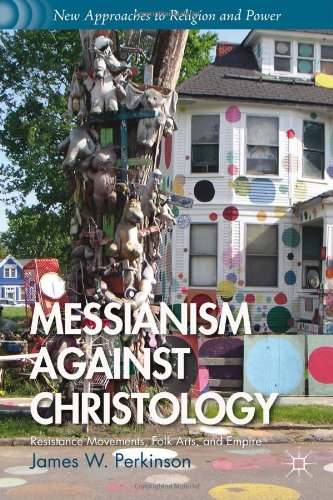 New hope is growing in places of abandonment as tendrils taking back what has been subsumed by so much concrete. While large scale urban abandonment in places like St. Louis, Baltimore, and Detroit has led to conditions of crushing poverty, fragmented family-life, and bleak, inhospitable cityscapes and living conditions for those abandoned there and with no means to escape, new possibilities of life are also opening that defy the present order. For so many of us caught in the thrall of the encroaching planetary crisis (like deer in headlights), not knowing where to turn and feeling sometimes ourselves simultaneously coaxed into a dull passivity and desperately abandoned to be consumed by the appetites of the powerful, the crumbling urban center stands as both sign of ruin to come and beacon of hope and possibility. James W. Perkinson’s latest book, Messianism, Against Christology: Resistance Movements, Folk Arts, and Empire (Palgrave Macmillan, 2013) is contained within the deteriorating and vacant yet vibrant and bursting with life cityscape of urban Detroit as a road into what will be defined as “messianism”: the spirit of resistance which counters heinous and inappropriate systems of death with creative opening of new possibilities for life. Messianism breaks these possibilities wide open through the engaging of imagination and invocation of memory of prior ways of being more viable and in step with the rhythms of creation through folk mediums (storytelling, song, dance, etc.) and through embodying those memories in creative action. The spirit of messianism and the new possibilities it engenders occur under the influence and charisma of one who refuses to be contained by and who galvanizes a following against hegemonic control and into alternative economies based on reciprocity and more egalitarian lifeways. It is a sort of artful defiance that exists under any socio/political/economic order which counters oppressive power with creative energy and compassion. 4/14/2015 Comments Supersessionism, Jewish Whiteness, and Liberating Biblical Study in Post-Ferguson AmericaBy: Gregory Williams GregWilliams 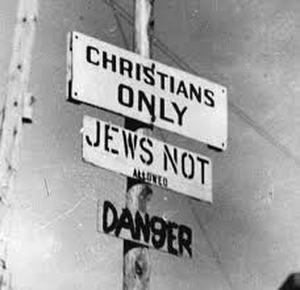 “Well, the text seems to say that Christianity supersedes Judaism.” I gasped, as did everyone else in the area. Not only could I not believe that I was hearing these words, but I couldn’t believe who the speaker was, either. The context was my New Testament exegesis seminar on the Epistle to the Hebrews and the speaker was my friend, Jeremy. Jeremy (a black Methodist pastor) and I (an Ashkenazi Jewish Christian) had become friends during the past two years and were, in particular, allies in predominantly liberal white protestant classrooms where we endeavored, together, to raise issues of poverty, slavery, empire, and anti-Semitism in biblical texts and historic Christian theologies, constantly pushing our professors with our “resistant readings.” In this particular class, we had been at this for the better part of a semester, and our efforts had included a thoroughgoing critique of supersessionism, the idea that the New Testament community sought to found a new religion, Christianity, which they conceived of as superior and a natural successor to the “old covenant” of Judaism. Thus, I was shocked when I heard him endorse the idea in class. “I wanted to test a theory,” he explained to me later. “You see, as a white Jew, every time you talk about supersessionism, no matter how much you are challenging our professor or our colleagues’ ‘traditional’ scriptural interpretations or theologies, you are listened to with respect. But whenever we try to talk about slavery, or genocide, or colonialism—well, let’s just say that the mention of any of these realities wouldn’t get the kind of gasp that my pretending for a moment to endorse supersessionism got. Now, I know that you want to critique absolutely everything, but doesn’t it bother you that white Jews always seem to be first in line to have their grievances heard in New Testament studies?” It didn’t take me long to realize that Jeremy was right. As a Jew, I interpret the Bible from the standpoint of a subaltern ethno-religious community that experienced more than a thousand years of geographic displacement, economic exclusion, cultural segregation, and, in the last century, genocide. As a white person, however, I experience the privilege of having my resistant readings of scripture always come first in line, often ahead of black and brown voices who speak from a subaltern community that experiences displacement, impoverishment, segregation, and violence right now, even as many Jews, including myself, are accorded white privilege in the twenty first century construction of race in America. By: Jeriah Bowser Note: This article was originally published at the Hampton Institute  His long, well-conditioned, light-brown hair glistens softly in the sun. His deep blue, penetrating eyes betray his Anglo-Saxon heritage. His well-manicured facial hair parts to reveal a gleaming set of perfectly straight, white teeth. His soft white skin and delicate fingers hint at a life free of manual labor and toil. The long, flowing white robe that wraps around his body must have been recently washed and bleached, as it radiates purity and divine goodness. The child in his lap and the crowds that have gathered around him with admiration and awe written all over their faces communicate that this man must be saying something incredibly important and inspirational. He teaches such divine truths as "Blessed are those who make lots of money, for God loves money" and "For God so loved the world, he made a special place for you to burn and suffer forever if you don't follow his moral boundaries" as well as "When someone slaps you on the cheek, turn to him the other also; unless your government decides that a group of people is a threat to your country, then go ahead and slaughter them." He is the patron saint of Capitalism. He is the author and originator of Manifest Destiny. He is a card-carrying member of the NRA and a proud Conservative Republican. He is invoked whenever one of his flock needs a new bike, car, house, or business merger. He rides atop our fighter jets and cruise missiles, and blesses our troops as they head off to foreign conquests. He is the epitome of the American dream- born into poverty and obscurity, yet through hard work and dedication he became a great prophet and then sacrificed his life for our sins. He is a prophet boldly upholding and defending the ideals that our glorious country was founded on. He is…. say it with me now… Jesus. By: Ryan Jarrell 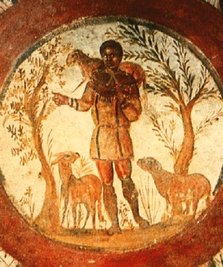 I am the good shepherd: the good shepherd giveth his life for the sheep. 12 But he that is an hireling, and not the shepherd, whose own the sheep are not, seeth the wolf coming, and leaveth the sheep, and fleeth: and the wolf catcheth them, and scattereth the sheep. 13 The hireling fleeth, because he is an hireling, and careth not for the sheep. 14 I am the good shepherd, and know my sheep, and am known of mine. -John 10:11-14 I ain’t talkin bout no money, I ain’t talking bout no cars, I ain’t talking bout no diamonds cause that shit is a façade -A$AP Rocky, Wassup As a newly convinced Quaker, this often under quoted parable was presented to me as the biblical basis of the pastorless organization of our worship community. And this point cannot be understated. If we are to bring the sweet solitude of the anti-cultural Kingdom of Heaven to the rooting places of Empire, our places of worship need to exemplify these values first and foremost. However, as my worship deepens and I continue to face that Spirit of the scripture in the desert of the heart, I find my Religious Societies simplistic explication of this particular parable lacks a certain depth. Upon increasing meditation, I find this sliver, more than a base allegation against the merits of monetary compensation, indeed unfolds into a critical facet of the Ghostly Shepherd’s ministry. |
Disclaimer
The viewpoints expressed in each reader-submitted article are the authors own, and not an “official Jesus Radicals” position. For more on our editorial policies, visit our submissions page. If you want to contact an author or you have questions, suggestions, or concerns, please contact us. CategoriesAll Accountability Advent Anarchism Animal Liberation Anthropocentrism Appropriation Biblical Exegesis Book Reviews Bread Capitalism Catholic Worker Christmas Civilization Community Complicity Confessing Cultural Hegemony Decolonization Direct Action Easter Economics Feminism Heteropatriarchy Immigration Imperialism Intersectionality Jesus Justice Lent Liberation Theology Love Mutual Liberation Nation-state Nonviolence Occupy Othering Pacifisim Peace Pedagogies Of Liberation Police Privilege Property Queer Racism Resistance Resurrection Sexuality Solidarity Speciesism Spiritual Practices Technology Temptation Veganism Violence War What We're Reading On . . . White Supremacy Zionism ContributorsNekeisha Alayna Alexis
Amaryah Armstrong Autumn Brown HH Brownsmith Jarrod Cochran Chelsea Collonge Keith Hebden Ric Hudgens Liza Minno Bloom Jocelyn Perry Eda Ruhiye Uca Joanna Shenk Nichola Torbett Mark VanSteenwyk Gregory Williams Archives
October 2017
|
Search by typing & pressing enter

 RSS Feed
RSS Feed